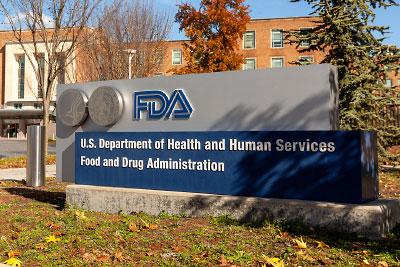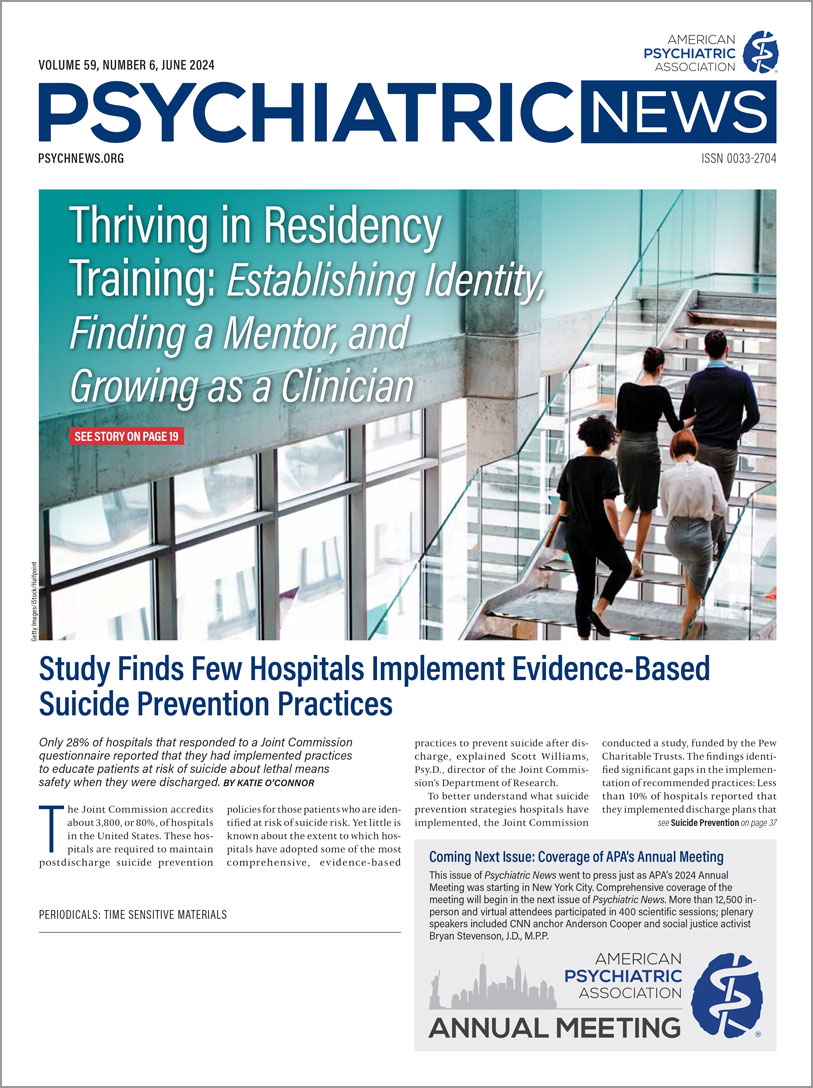FDA Approves Rapid-Acting Oral Antidepressant
Abstract
Clinical trials found that patients who took the twice-daily tablet, which contains extended-release dextromethorphan/bupropion, showed greater mood improvements than those taking placebo or bupropion alone, with signs of improvement as early as week one.

The Food and Drug Administration (FDA) in August approved Auvelity—an extended-release dextromethorphan/bupropion tablet—for the treatment of major depressive disorder in adults.
This combination pill is the first FDA-approved oral antidepressant that does not primarily target the monoamine neurotransmitters serotonin, dopamine, and norepinephrine. Rather, this agent targets the N-methyl-D-aspartate (NMDA) and sigma-1 receptors, which are known to regulate the neurotransmitter glutamate. (While the FDA-approved antidepressants esketamine and brexanalone target NMDA and GABA receptors, respectively, esketamine is available only as a clinician-administered nasal spray and brexanalone is available only for intravenous administration.)
Auvelity Offers Rapid Depression Relief, Trials Suggest
It was the successful clinical trials of ketamine and esketamine for depression that paved the way for Auvelity, Dan Iosifescu, M.D., a professor of psychiatry at NYU Langone Health, told Psychiatric News. Iosifescu is a member of the advisory board of Axsome Therapeutics, manufacturer of Auvelity.
“Ketamine operated on a completely novel mechanism of action that opened up a whole new field of research,” he said. “However, it was apparent early on that ketamine’s clinical application might be limited” due to side effects of the medication requiring close monitoring of patients.
In search of an oral alternative to ketamine with fewer side effects, Iosifescu and his group turned to dextromethorphan—a chemical most known for its cough suppressant properties. The issue with dextromethorphan is that while it is a strong inhibitor of the NMDA receptor, it is quickly metabolized, Iosifescu noted. “About an hour after you take it, it’s gone from your system,” he said.
To slow the metabolism of dextromethorphan, the researchers knew they needed to pair it with another compound that could inhibit CYP26, the enzyme that metabolizes dextromethorphan as well as many other compounds. Iosifescu and colleagues began working with Nuedexta—a combination of dextromethorphan and quinidine used to treat pseudobulbar affect (a neurological condition characterized by uncontrolled episodes of crying, laughing, or other emotional reactions without any underlying stimulus). As a depression treatment, quinidine was a good partner for dextromethorphan, Iosifescu said, since in addition to blocking CYP26 it doesn’t cross the blood-brain barrier.
Iosifescu and colleagues conducted an open-label clinical study of dextromethorphan/quinidine in adults with treatment-resistant depression and found many patients experienced significant mood improvements. Soon after presenting these results, representatives from Axsome reached out to Iosifescu and said they were also pursuing dextromethorphan as a possible antidepressant. However, rather than using quinidine to block CYP26, the company was focused on pairing dextromethorphan with bupropion.
The approval of Auvelity was based on two large clinical trials. The first was a placebo-controlled trial known as GEMINI, which included 327 adults with major depression who were randomized to either twice daily Auvelity (45 mg dextromethorphan and 105 mg bupropion combination) or a placebo tablet. After six weeks, Montgomery-Åsberg Depression Rating Scale (MADRS) scores dropped by an average of 16 points in the group that received Auvelity compared with 12 points in the placebo group. In addition, about 40% of adults taking Auvelity achieved remission (defined as MADRS score of ≤10) compared with 17% of those taking placebo. Clinical differences between Auvelity and placebo were evident within one week of treatment.
The second trial, called ASCEND, involved 97 adults with major depression who received either Auvelity (45 mg dextromethorphan and 105 mg bupropion combination) or 105 mg bupropion alone twice daily. After six weeks, adults taking Auvelity showed greater reductions in MADRS scores than those taking bupropion (14 points vs. 9 points, respectively) and greater remission rates (47% vs. 16%, respectively). The changes in MADRS score were significantly greater in the group receiving Auvelity beginning at week 2.
Iosifescu said this second trial was important given that bupropion is itself approved as an antidepressant. “Some people might have thought that dextromethorphan was just along for the ride, but we showed that of the pair, dextromethorphan was carrying the day,” he said.
Auvelity was also well tolerated and had a side effect profile similar to other oral antidepressants (dizziness, nausea, dry mouth, and decreased appetite were the most common); there was no indication of any metabolic problems or sexual side effects.
Who Will Benefit Most From Auvelity?
“I was excited when I heard the news about this compound’s approval,” said James Murrough, M.D., an associate professor of psychiatry and neuroscience and director of the Depression and Anxiety Center for Discovery and Treatment at the Icahn School of Medicine at Mount Sinai. Murrough collaborated with Iosifescu’s team when testing the antidepressant effects of dextromethorphan/quinidine but was not involved with the clinical development of Auvelity and is not connected with Axsome.
In addition to offering a new type of antidepressant, the approval of Auvelity is a success story for rationally designed drug combinations, he explained. “There have been many high-quality psychiatry studies trying to achieve therapeutic synergy by combining two medications that should complement each other,” he said. “Until recently, the results have typically been disappointing.”
While happy that psychiatrists have one more tool in their therapeutic arsenal, Murrough said it’s still uncertain which patients might benefit most from this new medication.
An Axsome-sponsored trial conducted solely in patients with treatment-resistant depression failed to detect a difference between Auvelity and placebo after six weeks.
“[T]he anticipated excitement regarding use of the [dextromethorphan/bupropion] combination in the refractory depression population needs to be tempered until further clinical experience is gained and more study in patients with treatment-resistant depression is accomplished,” Alan Schatzberg, M.D., the Kenneth T. Norris Jr. Professor of Psychiatry and Behavioral Sciences at Stanford University, noted in an editorial in The American Journal of Psychiatry.
“Any new antidepressant is going to be more expensive than older medications, so this drug won’t be a first-line agent for a while,” Iosifescu said. Though he agreed further work with people with treatment-resistant depression is needed, he noted many participants in his clinical studies had taken previous antidepressants, so Auvelity could be a second-line option.
Given its purported effects on the NMDA receptor, Iosifescu thinks one intriguing option for Auvelity is as a take-home medication for people who received ketamine treatment. “In theory, someone who benefits from ketamine would also benefit from this tablet,” he said. “A patient could take it regularly or maybe just as a rescue medication if symptoms relapse,” he said. That is just one of several clinical possibilities that should be tested, he said. Iosifescu also noted that his group is testing Auvelity as a treatment for agitation in adults with Alzheimer’s.
According to Axsome, Auvelity is expected to be commercially available by the end of this year. ■



